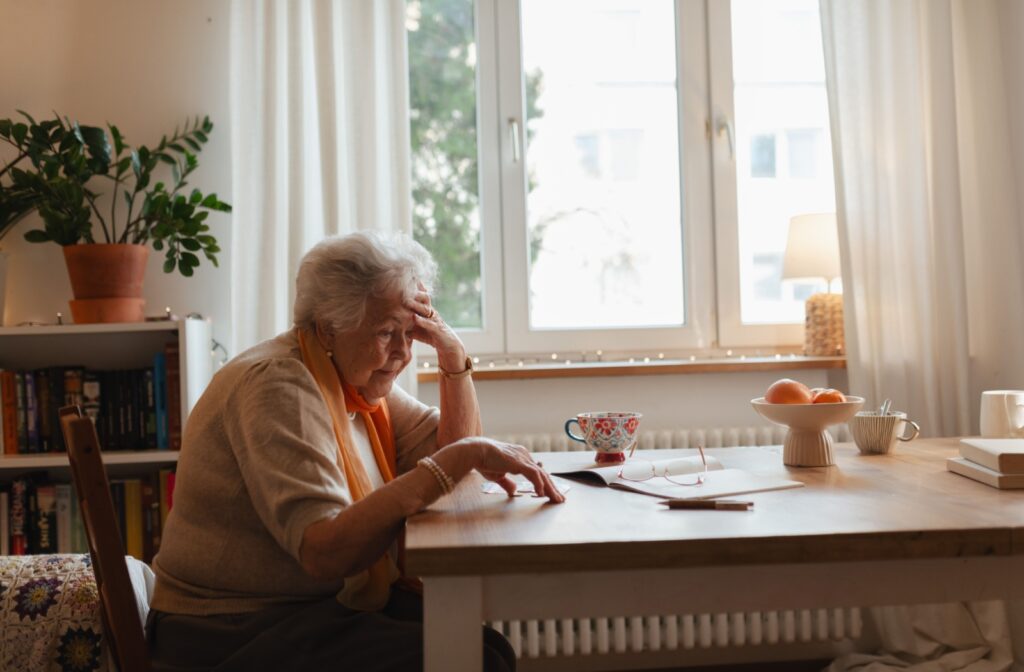Deciding to transition to assisted living is never easy. It’s a highly personal choice that often accompanies a mix of emotions for seniors and their families.
Six key signs that assisted living may be the right next step for your loved one include:
- Decline in physical health
- Concerning memory loss
- Difficulty managing daily tasks
- Increasing social isolation
- Safety concerns
- Family caregiver burnout
Recognizing the signs that suggest it may be time for this move is crucial for ensuring the safety, health, and overall well-being of your loved one.
- Observable Decline in Physical Health
Physical health is often one of the first indicators that additional care might be necessary. While occasional illnesses or temporary discomfort are regular, consistent and significant changes in physical abilities or health habits suggest a need for more comprehensive support.
Changes in Mobility
Struggles with walking, balance, or mobility can increase the risk of falls and injuries. If your loved one has difficulty navigating stairs, frequently stumbles, or avoids certain areas of their home due to mobility issues, consider whether assisted living could provide safer living arrangements and regular monitoring.
Hygiene Concerns
Declines in hygiene, such as wearing the same clothes for days, unusual body odor, or an unkempt appearance, can indicate physical limitations or cognitive struggles. Assisted living can ensure that regular grooming and hygiene become part of their routine again.
Eating Habits
Another concern is a noticeable change in eating habits, such as skipping meals, weight loss, or relying on processed or unhealthy foods due to difficulty cooking. Assisted living typically provides nutritious, balanced meals, removing the burden of meal preparation while improving overall health.
- Memory Loss & Forgetfulness
Everyone forgets things from time to time, but persistent or severe memory loss can be a warning sign of cognitive decline or conditions like dementia.
Forgetting essential tasks, such as turning off appliances, locking doors at night, or remembering appointments, can be risky and even life-threatening. Assisted living communities often have specialized memory care services to support people with memory-related challenges, providing a structured and secure environment.
- Difficulty Managing Daily Tasks
As we age, the tasks that once seemed routine can become overwhelming. Struggling with everyday responsibilities may indicate it’s time for assistance.
Household Maintenance
If your loved one’s home has become cluttered, dirty, or in disrepair, it may indicate that they can no longer effectively maintain their living environment.
Assisted living communities handle the burden of housekeeping and home maintenance, allowing residents to focus on enjoying day-to-day life without worry.
Managing Finances
Late bills, stacks of unopened mail, or financial mishaps could signal a challenge in managing finances. Assisted living communities simplify this by eliminating most of the day-to-day financial tasks surrounding utilities, rent, and maintenance.
Medication Management
Missing doses of medication or doubling up on pills can pose serious health risks. Many assisted living communities provide medication management services, ensuring residents take their prescriptions at the right time and in the correct doses.
- Social Isolation
Loneliness and isolation are prevalent among older adults. A lack of regular human interaction can lead to depression, anxiety, or a decline in overall well-being.
Assisted living fosters a community atmosphere where residents can participate in group activities, build peer relationships, and enjoy shared meals. These connections can greatly enhance mental health and quality of life.
- Safety Concerns

Living alone, especially if your loved one has mobility or cognitive challenges, can pose significant safety risks.
Home Safety Risks
Hazards such as stairs, slippery floors, or an inability to respond to emergencies like fire alarms can endanger seniors’ ability to live independently.
Benefits of Secure Living
Assisted living communities have safety features like grab bars, emergency response systems, and trained staff available 24/7. These measures drastically reduce risks while providing peace of mind for families and loved ones.
Preventative Measures
Moving to an assisted living community before an accident occurs allows seniors to maintain their independence in a secure environment, rather than reacting to an emergency that might hasten the transition to long-term care.
- Caregiver Burnout
Caring for an aging loved one can be rewarding, but it can also be physically and emotionally draining. If you’re noticing signs of burnout, it might be time to seek additional support.
Signs of Burnout
Caregivers often experience fatigue, irritability, stress, and physical symptoms like headaches or trouble sleeping. These feelings can lead to strained relationships and compromised care for your loved one.
Impact on Health
Burnout can have a negative impact on the health of both the caregiver and the loved one. Seeking help ensures both parties maintain better physical and mental well-being.
Seeking Support
Assisted living enables caregivers to prioritize their own health, knowing their loved one is being well cared for by professionals.
Choosing Assisted Living
Deciding to transition a loved one to assisted living can feel overwhelming, but recognizing the signs and exploring options early allows you to make an informed and compassionate decision.
When evaluating communities, consider visiting prospective communities and speaking with their staff to understand the level of care, amenities, and community atmosphere they offer. Take this time to involve your loved one in decision-making, ensuring they feel empowered and supported throughout the transition.
Independence is key at Hamilton House. Our staff strives to provide it for each of our residents, regardless of their lifestyle. However, eliminating tasks and chores that can consume your time and energy can leave more room for fun and leisure. Contact us today to learn how we can support your loved one.



